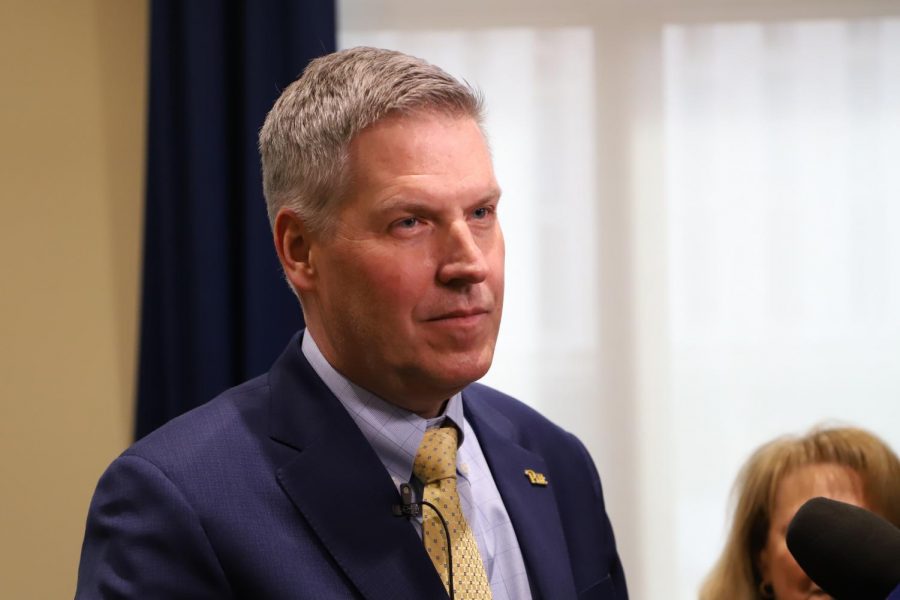Gallagher talks Omicron, spring semester in TPN interview
Chancellor Patrick Gallagher.
January 25, 2022
Chancellor Patrick Gallagher said although COVID-19 cases have been elevated since the start of the spring semester due to the highly transmissible Omicron variant, he is expecting “much better numbers in the next four weeks or so.” According to data from The New York Times, Omicron cases have peaked in both Allegheny County and the Pittsburgh metro area.
“We just looked at it this morning. Yes, both the student population and the faculty-staff populations are following the same trend,” Gallagher said. “The wild card here is the students, because when you have a big cohort come back, they’re coming from different parts of the country which are at different parts of the peak, so initially they’re gonna be at the same place as wherever they came from.”
Gallagher spoke with The Pitt News for about 20 minutes on Tuesday about the Omicron COVID-19 variant, recent faculty unionization vote and college experience during a pandemic. The interview was the first time the chancellor took questions from The Pitt News since early September.
“None of us wanted an Omicron”
The chancellor said given the situation, he thinks things have gone “relatively OK” so far during the spring semester.
“None of us wanted an Omicron. We had had a pretty good fall semester,” Gallagher said. “But if the last two years have taught us anything, it’s that it’s unpredictable and you have to be pretty agile. Omicron was yet another new wrinkle.”
Students arrived on campus in three batches this spring, and entered a shelter-in-place which is lifting on Thursday. Gallagher said “availability of testing” led to the decision to spread out arrival, and classes began remotely to “make sure there weren’t some students who could go to class and others that couldn’t.”
“We really wanted to make sure we could robustly test and sort of establish a baseline, and make sure we could create localized outbreaks from that,” Gallagher said. “It was availability of testing that forced us into this three-arrival cohort. … The numbers seem to be supporting that the strategy was pretty effective.”
Gallagher said he is hoping for a return to a more regular semester by the end of this week.
“I’m looking forward to getting back into — I’m not going to say more normal because who even knows what that means anymore — but a more typical and hopefully more productive term,” Gallagher said.
“The flexibility needs are there”
The chancellor also provided a brief update on Pitt’s permanent vaccination policy, which remains a work in progress. The University convened a committee with various shared governance representatives, including Senate Council President Robin Kear, last semester to write the permanent policy and they have met at least once. Pitt is currently operating on an interim policy, which required students, faculty and staff to complete a series of COVID-19 vaccine doses before Dec. 6.
“We’ll know more once the group has offered a draft. The good news is we have an interim policy that’s in place,” Gallagher said. “If we had to, we could make adjustments to the interim, even while this other process is playing out.”
Gallagher added that Pitt currently defines vaccination as completion of an initial dosage series, but noted that many scientists have been saying it is time to update that definition to include the emergence of booster doses. He said this is something the committee is discussing.
The chancellor said he is in the “as soon as possible camp” for completing the permanent policy, at the same time that “no one wants the administration to ramrod it, either.”
“The real thing that I focus on is I don’t want the enforcement side — in other words, the requirement or mandate side — to be the only thing that drives what we do,” Gallagher said. “We’re not waiting to push boosters until that process is done. We’ve been hosting a lot of vaccination clinics, both the continuous ones on Fifth Avenue but also large-scale booster clinics.”
“We’ve really ramped up our educational efforts to make sure that all of our students, faculty and staff know that the best thing they can do to protect their own health is to … make sure they’re up to date with their immunization,” he added.
Even with Pitt’s vaccination percentage in the high 90s, some professors with young children at home — some too young to be vaccinated against the virus — are wary about catching COVID-19 on campus and bringing it home. Gallagher said there are a myriad of reasons for why the University must remain flexible during the pandemic.
“What I think is starting to happen is we’re seeing a limit to how much of the flexibility can be established by a University-wide policy. There’s simply so much variety in classroom types, courses, but also in the services we provide,” Gallagher said. “What we’ve really been trying to do is push the responsibility for being flexible to the people who can apply it in a way that makes the most sense under the circumstances. What that means, increasingly, is first-line supervisors and faculty.”
Faculty union
Work flexibility will likely come up as a point of bargaining, as the recently formed faculty union begins negotiations with the University administration. Faculty voted by a wide margin in October to unionize, following years of campaigning and previous failed attempts. While the chancellor said it’s too early to outline any sort of timeline on the negotiations, he said he hopes for an open relationship between the faculty union and administration, as well as clear communication.
“Our approach is we think the union and the faculty want the same thing we do, which is what’s best for the University of Pittsburgh. So we’re approaching this in the spirit of openness and good faith. I’m looking forward to working with them,” Gallagher said. “I see no reason why we can’t work together to make sure this is the best University we can be.”
Oakland Crossings
Gallagher also spoke on Walnut Capital’s plans for Oakland development and said it is no longer the “sleepy old days where nothing happened in Pittsburgh.”
Private developer Walnut Capital’s controversial Oakland Crossings proposal would rezone about 17 acres of Central Oakland, and has drawn differing reactions from community groups and residents. The project would make way for a grocery store, high density “walk to work” housing and a pedestrian bridge across the Boulevard of the Allies, among other changes.
Zoning legislation to enable the plan is currently before the City Planning Commission, and Mayor Ed Gainey spoke at a Tuesday evening community meeting about the project, and will hold his own meeting next week. Pitt is partnering with Walnut Capital on some elements of the project, such as demolishing a series of Bates Street row houses and redeveloping a University-owned property at 3401 Boulevard of the Allies into a grocery store and residential housing.
Gallagher said the entire Pitt community is a stakeholder in this proposal as the development is “close to home” and “our neighborhood, too.” He said Pitt takes being a stakeholder seriously and wants to see positive development in the Oakland area.
“There are different viewpoints, there always are in these sorts of things. And we’ll continue to be a good partner — these are our neighbors and that doesn’t change. We’d like to see improvements to Oakland for everyone,” Gallagher said. “We’ve agreed that equitable development and one that addresses some of the long-term needs like food availability and walk-to-work housing, affordable housing and other types of options are important. I think Mayor Gainey’s efforts to make sure that that engagement has been robust are applauded and we’re looking forward to participating in that.”
Commencement planned to be in person
With graduation looming for seniors in May, Gallagher said commencement plans are in the works and are being handled by the provost’s office. He said, circumstances permitting, the University is planning on in-person graduation ceremonies.
Navigating the pandemic
Most students — excluding seniors — have not had a full year of college unaffected by COVID-19. With the normal college experience nonexistent and no way to fully “repair the disruption,” Gallagher said students should challenge themselves to make the most of the situation.
“I think there’s an opportunity in the midst of really uncertain times and disruption to take on new kinds of responsibility that wouldn’t even be there under normal times,” Gallagher said. “It’s harder, it’s less organized, everyone’s kind of reacting, but there’s enormous opportunities and a lot of our students have done this.”
During these uncertain and stressful times, the chancellor reminded the community of the importance of supporting one another if people are going to reach out and take those opportunities. Gallagher said all students should take advantage of these times to find growth and the “silver lining of opportunity” during a crisis.
“I think that if the quest is normalcy, then maybe we’re doomed to not satisfy that itch,” Gallagher said. “But if your college experience is also about taking on … growing your horizons — sometimes being out of your comfort zone is where you grow the most.”



